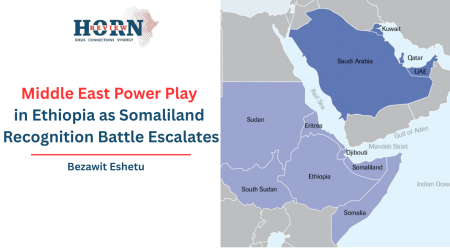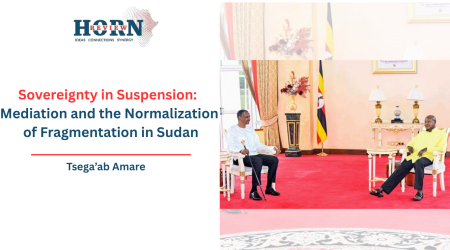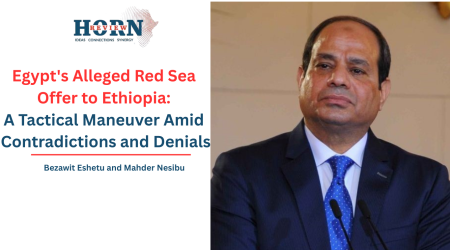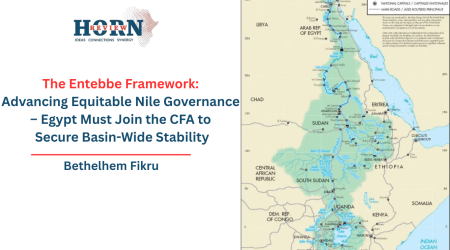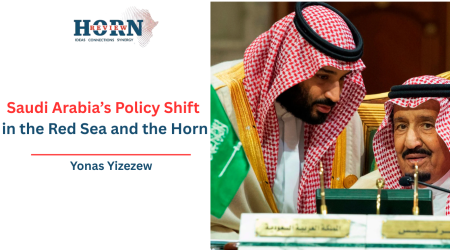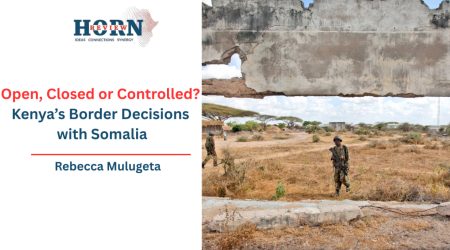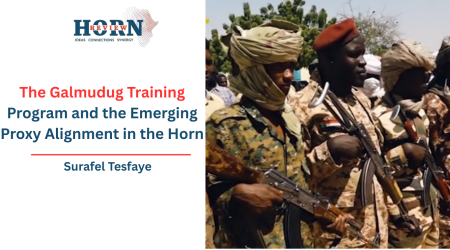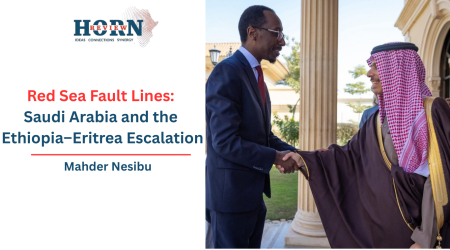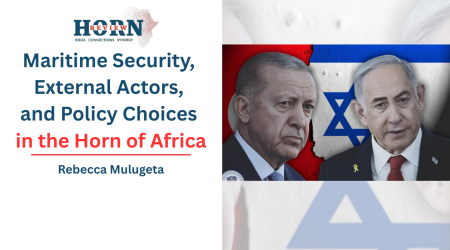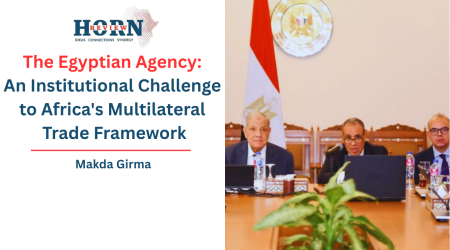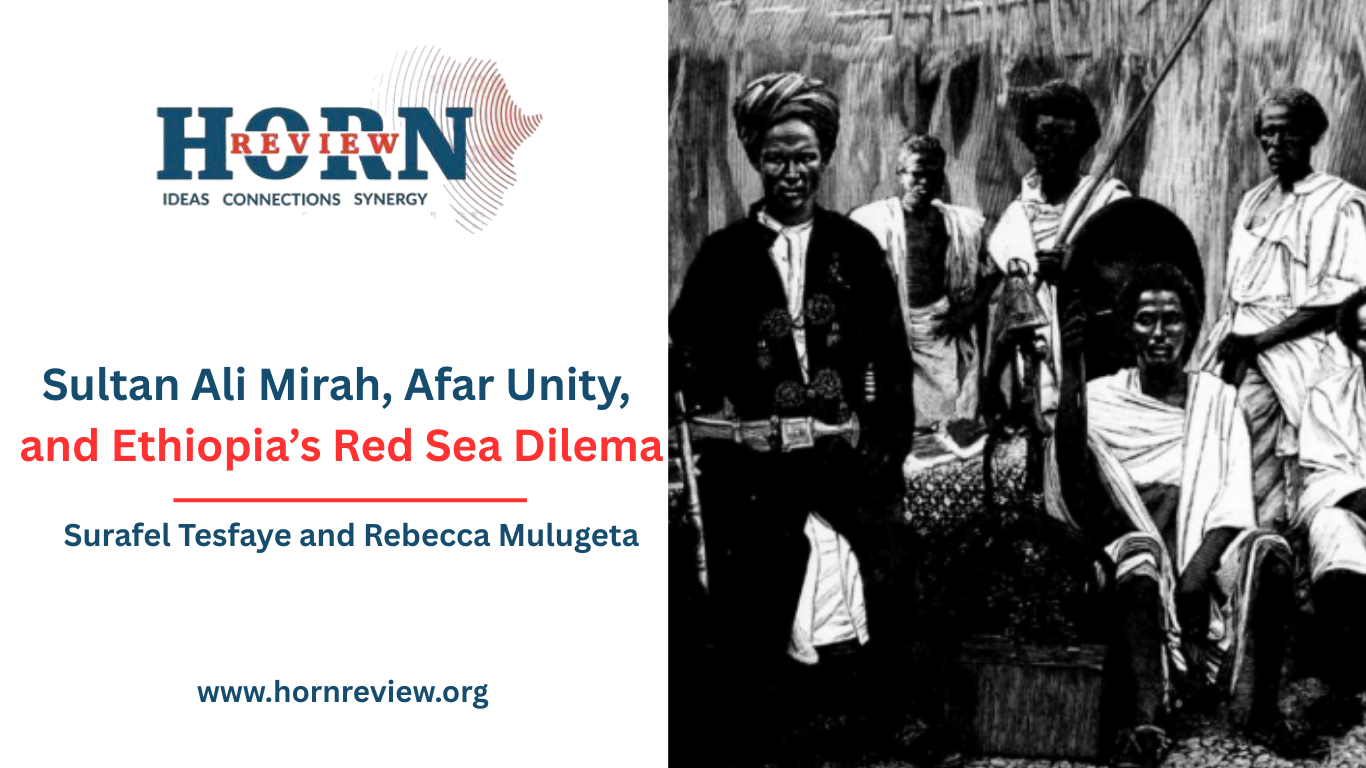
6
Nov
Sultan Ali Mirah, Afar Unity, and Ethiopia’s Red Sea Dilema
Since 1993, the defining strategic dilemma for Ethiopia has revolved around an existential vulnerability: its complete dependence on foreign ports to access global trade routes. This geopolitical bottleneck is not merely a logistical challenge but a matter of national survival requiring a fundamental paradigm shift not just diplomatic niceties or transient agreements. In this context, attention turns inevitably to Djibouti, a small but decisive neighbor whose political landscape is now poised at a crossroads amid constitutional revisions and approaching elections.
Could Djibouti witness an unprecedented transformation, a historic political realignment where an Afar-led government, intrinsically aligned with Ethiopia’s national interests, rises to power? Such a development would potentially unlock Ethiopia’s enduring aspiration to reclaim a sovereign maritime gateway to the Red Sea. This provocative question demands reflection on the perilous historical pathways that shaped the region, notably the strategic blunder under the Derg regime that alienated Sultan Ali Mirah, a pivotal Afar leader who opposed Eritrean secession and championed Afar unity within a Greater Ethiopia framework.
Understanding this prospective geopolitical inversion requires revisiting Djibouti’s colonial genesis an absolute imperative rather than an academic luxury. France’s foothold started in 1862 with the acquisition of the Obock port, cemented through treaties with Afar sovereigns, including Dini Ahmed Anou baker (also Known as Sultan Ahmed). Yet the natural limitations of Obock’s harbor compelled a bold pivot by colonial Governor Léonce Lagarde in 1896, who relocated the capital and port operations to Djibouti City. This site offered deep-water access and linked established caravan networks, setting the stage for the port’s rise.
The Franco-Ethiopian railway, finalized in 1917 under Emperor Menelik II, represented far more than a commercial agreement; it was a foundational strategic covenant. This infrastructure decisively established the Port of Djibouti as Ethiopia’s vital economic artery, transforming it into the indispensable eastern lifeline for global trade. The port immediately attained status beyond a simple transit point, becoming the functional symbol of Ethiopia’s sovereign connectivity to the international marketplace.
Emperor Menelik ceded approximately 12,000 square kilometers to France through the 1897 Franco-Ethiopian border agreement, with France recognizing Djibouti as Ethiopia’s natural outlet. Despite entering bilateral agreements possessing coastal outlets with colonial powers, Ethiopia never accepted inter-European treaties that isolated it from the Red Sea coast. At various times, Ethiopian leaders asserted that their territory extended beyond the Horn of Africa, and Menelik declared his refusal to be a passive observer while European powers divided the continent. Throughout this history, foreign powers have sought to undermine Ethiopia’s ambitions, actively denying it direct sea access.
However, the colonial state deliberately institutionalized ethnic divisions, nurturing rivalry primarily between the Afar in the north and the Issa Somalis in the south. This divide-and-rule strategy ensured French dominance by keeping local communities fragmented and competitive. The legacy of this fabric of ethnic tension shaped Djibouti’s modern political landscape, where Issa dominance and Afar marginalization have become entrenched political features.
Amid decolonization waves, the Afar people living across Ethiopia, Eritrea, and Djibouti found themselves at a geopolitical juncture. Unlike many groups clamoring for outright independence, the Afar were cautious. Their reservations centered on the fear of domination either by an Issa-majority Djibouti state or a pan-Somali “Greater Somalia” project. This fear made them wary of full sovereignty and drove their preference for autonomy within a stable configuration that safeguarded their rights and identity.
Emperor Haile Selassie’s approach was one of pragmatic geopolitics. He understood that an independent Djibouti under Issa or Somali control would sever Ethiopia’s vital maritime access and expose the nation to hostile nationalist currents. His doctrine tacitly supported continued French colonial control, not for colonialism’s sake, but as a bulwark preventing Somali expansion or Islamic-Arab influence detrimental to Ethiopia’s interests.
This strategic outlook materialized in proactive moves: the 1959 Ethiopia-France agreement guaranteed Ethiopian customs-free access to Djibouti’s port. Beyond formal diplomacy, covert Ethiopian missions actively engaged both Afar and Issa factions extending across borders, mobilizing them to favor French association during the 1967 independence referendum. This deep involvement signaled Ethiopia’s uncompromising commitment to maintaining the fragile regional balance securing its access.
Central to Ethiopia’s regional strategy was alliance building with Afar leaders who shared its apprehensions about Somali plans. The Afar Liberation Front (ALF), under Sultan Ali Mirah Hanfare, aligned ideologically with Haile Selassie, seeking autonomy and self-determination within a Greater Ethiopian framework rather than outright independence. Their vision envisaged a contiguous Afar homeland bridging Ethiopia, Eritrea, and Djibouti, fortifying Ethiopia’s influence over strategic coastal areas.
Conversely, the Djiboutian Mouvement pour la Libération de Djibouti (MLD) opposed French rule and resisted Issa political dominance. Supported covertly by Haile Selassie, the MLD pursued secessionist goals aimed at Afar unification under Ethiopian sovereign, aligning closely with the ALF’s agenda despite differing contexts. The main reason behind the support of Haile Selassie MLD by finance was that the group came to the province of diredewa, the emperor also gave them a place to fight against the unity of afar that can integrate Afars from Djibouti as well. Furthermore, Ethiopia proactively engaged in geopolitical influence operations concerning the 1967 French Somaliland referendum. The tactical deployment involved dispatching a high-level diplomatic envoy to synchronize efforts with key stakeholders, ensuring a favorable outcome where a pro-French majority voted to maintain association with the French entity. This intervention is retrospectively classified as a highly successful strategic achievement in preserving Ethiopia’s regional interests.
However, the advent of the Derg regime marked a rupture. The Marxist-Leninist military dismissed these delicate allegiances, antagonizing the ALF and forcing Sultan Ali Mirah into exile. The resulting armed resistance from an erstwhile ally transformed regional dynamics. The regime’s ideological inflexibility and suppressive tactics further fragmented the Afar community, emboldening splinter groups such as the Afar National Liberation Movement (ANLM), some of which collaborated with the Derg against their kin.
This fragmentation and suppression came at a critical historical juncture. The ALF’s retaliation, including disrupting key highways linking Ethiopia to the Red Sea port of Assab, severely destabilized the regime economically and politically. The Derg’s failure to preserve the Afar alliance not only weakened domestic control but also shattered Ethiopia’s potential to consolidate influence over the Red Sea coast, notably the historically Afar-governed Obock region of northern Djibouti.
Simultaneously, Eritrea’s secession struggle overshadowed Afar claims, which were marginalized by the dominant Eritrean liberation fronts ignoring Afar autonomy demands. The 1993 Eritrean secession referendum, even though it was watched by the international community, failed to address the Afars demand, finalizing Ethiopia’s loss of Assab port access and deepening Afar marginalization across national boundaries.
Subsequent Ethiopian policies under the EPRDF introduced ethnic federalism, nominally recognizing regional Afar autonomy. Yet this arrangement fell short of addressing aspirations for true Afar unity and territorial integrity, leaving communities vulnerable economically and politically fragmented. The failure to integrate and empower Afar groups meaningfully perpetuated a legacy of internal division and weakened Ethiopia’s strategic posture.
Had the Derg embraced a strategic partnership with Sultan Ali Mirah and the ALF, the trajectory could have been vastly different. A unified Afar front might have bolstered Ethiopia’s negotiating position vis-à-vis France and delayed or reshaped Djibouti’s independence trajectory. Such an alliance would have mitigated Somali-Issa dominance and reinforced Ethiopia’s maritime access, preserving crucial economic lifelines and regional stability through ethnic solidarity.
Had this partnership been operationalized, the ALF would have scaled its political and military capabilities to become a decisive internal power broker by 1991. This enhanced capacity would have endowed the Afar with the requisite veto authority to strategically challenge and block the TPLF-led EPRDF’s unilateral decision to transfer control of Assab to the EPLF. Fundamentally, the potential for robust Afar autonomy and influence within the Ethiopian state architecture was first degraded by the Derg’s strategic miscalculation and then permanently decommissioned by the EPRDF’s subsequent territorial disposition
The Derg regime initiated this downward trajectory with a profound realpolitik blunder, choosing hostile confrontation against the influential Afar Liberation Front (ALF) and Sultan Ali Mirah Hanfare. This confrontational approach not only neutralized the strongest indigenous force capable of securing the Red Sea approach but also squandered the crucial opportunity to leverage the ALF’s position to anchor Djibouti in a strategic confederation with Ethiopia, ensuring an enduring, Afar-backed corridor to the sea.
Compounding this error, the EPRDF delivered the ultimate existential blow by accepting colonial-era boundaries during Eritrea’s secession. While granting the Afar people internal autonomy, this external policy fatally dismissed their core aspiration for a unified, coastal region within Ethiopia, resulting in the permanent, catastrophic loss of the port of Assab, a vital economic and cultural hub. In essence, both major regimes, through internal conflict and external political calculus, consistently marginalized a critical internal constituency, irrevocably compromising Ethiopia’s sovereignty and cementing its landlocked vulnerability.
Both the Derg regime and later the EPRDF missed critical opportunities to leverage internal Djiboutian conflicts, such as the civil war from 1991 to 1994. A government with a keen strategic vision would have used these tumultuous moments to strengthen its alliances, particularly with the Afar, to expand its influence. Instead, preoccupied with internal struggles, these regimes failed to engage effectively in a long-term geopolitical strategy in their immediate neighborhood. The tragic irony lies in the EPRDF’s approach.
Coming to power under the banner of ethnic federalism and self-determination, it paradoxically ignored Afar’s rights during a crucial transitional period. By acquiescing to the EPLF’s control over all of Eritrea including Assab the EPRDF unwittingly repeated the Derg’s error of treating the Afar as mere pawns in a broader regional game. This has had profound, lasting consequences. It fueled the radicalization of Afar nationalism and, critically, left Ethiopia landlocked, severed from its historic access to the Red Sea.
The Derg wasn’t just reckless, it was overwhelmed by multiple wars from TPLF, EPLF,OLF, somalia invasions and such alike its decision to ‘Renounce’ Djiboyui may have been tactical retreat not ignorance. However, The Derg’s short term survival instinct blinded Ethiopia’s long term geopolitical survival.
If left unchecked, the “Somalization” of Djibouti driven by the growing influence of Somali groups will permanently alter the demographic and political balance within the country. This shift increasingly sidelines the Afar people, thereby diminishing Ethiopia’s long-standing cultural and political influence over a vital segment of Djibouti’s population.
Instead, the regime’s violent crackdown created long-term adversaries who undermined Ethiopia’s cohesion and regional influence. Coupled with Ethiopian acquiescence to Eritrean secession neglecting Afar territorial concerns this complicated Ethiopia’s geopolitical isolation, tightening the noose on its fragmented maritime ambitions.
Today, Djibouti’s political landscape remains volatile, with deep-rooted ethnic competition and external influences shaping policy directions. The Issa majority continues to dominate, but constitutional reforms and elections create openings for change. The prospect of an Afar-led government aligned closely with Ethiopia could redefine regional geopolitics, offering a pathway for Ethiopia to reclaim maritime access through historical ethnic and political linkages.
Yet, current tensions persist. Ethiopia’s relationship with Djibouti faces challenges, including controversies over port management concessions to DP World, perceived as limiting Ethiopian trade interests, and recent agreements granting Saudi access to the Tadjoura port moves raising diplomatic concerns in Addis Ababa
Ethiopia’s Path forward demands a nuanced, inclusive diplomatic approach that reconciles ethnic claims with pragmatic geopolitics. Recognizing Afar historical grievances and promoting self-autonomy initiatives within a broader strategy of regional integration can build a durable partnership. This approach must balance ambition with caution, avoiding past mistakes that fractured alliances and destabilized the Horn of Africa. Simply supporting ‘An Afar Leader’ in Djibouti is a naive and potentially dangerous strategy. The national interest of Ethiopia and the aspirations of transnational nationalism are not always aligned.
Navigating between History and Strategic Imperatives The saga of Ethiopia, the Afar people, and Djibouti is a complex tapestry of missed opportunities, ethnic identity struggles, and enduring strategic needs. Haile Selassie’s foresight to ally with Afar interests to secure maritime lifelines was visionary, but its discontinuity under subsequent regimes imperiled Ethiopia’s access to the sea.
As Djibouti stands at a political turning point, Ethiopia faces a pivotal choice: to reignite historic Afar solidarity and construct a diplomatic revolution that reclaims its maritime destiny or to risk further marginalization in a fractious region. The lessons etched by history warn that neglecting ethnic realities risks conflict, while embracing them with strategic clarity promises a more stable, interconnected Horn of Africa. Ethiopia’s future and by extension the Afars hinges on the delicate balance of pragmatism, inclusion and boils political Vision.
By Surafel Tesfaye and Rebecca Mulugeta, Researchers, Horn Review
Disclaimer:
The views and opinions expressed in this writing are solely those of the authors and do not represent the official position, policy, or endorsement of Horn Review, or any partner institution with which the authors is or has been affiliated. This piece is written in the authors’ personal capacity and is intended to inform intellectual and policy discussion purposes only.

